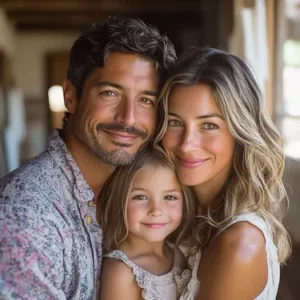I have always worn my badge of “Modern, Trusting Parent” with a distinct sense of pride. In a world of tracking apps, constant text monitoring, and parents who hover over their children like anxiety-ridden helicopters, I consciously chose a different path.
I wanted to be the mother who offered space, the one who understood that privacy is the currency of adolescence, and that trust is a two-way street paved with mutual respect. I told myself, and anyone who would listen, that my fourteen-year-old daughter and I had an understanding. She knew the rules, and I knew her heart.
But theories are easy to maintain when they are hypothetical; they are much harder to hold onto on a rainy Sunday afternoon when the door to your daughter’s bedroom is firmly closed and a boy is inside.
My daughter is fourteen, an age that feels like walking a tightrope between childhood innocence and the complex emotional landscape of young adulthood. Her boyfriend is the same age, a boy who, by all accounts, is the picture of teenage politeness.
He is the kind of kid who remembers to take his sneakers off at the front door without being asked, lining them up neatly on the mat. He greets me with a shy but audible “Hello, Mrs. Roberts,” and he never forgets to thank me for the snacks I inevitably force upon them. He is gentle, soft-spoken, and surprisingly respectful.
On paper, he is the dream first boyfriend. But the reptilian part of a mother’s brain doesn’t care about polite greetings or neatly aligned sneakers. It cares about hormones, impulse control, and the terrifying reality that fourteen-year-old judgment is not fully formed.
It was a Sunday, their usual day to hang out. They had retreated to her room around one o’clock.
At first, the sounds drifting down the hallway were comforting and innocuous—the bright bursts of laughter, the thud of a backpack hitting the floor, the animated chatter about school drama and viral videos. It was the soundtrack of normal friendship. I busied myself in the kitchen, wiping down counters that were already clean and reorganizing the spice rack for the third time that month, humming to myself to drown out the quiet nagging in the back of my mind.
However, as the afternoon wore on, the atmosphere in the house shifted.
The bright chatter faded, replaced by a silence that felt heavy and thick. The occasional laughter became softer, more muffled, transforming into low whispers that I couldn’t quite decipher from the living room. My imagination, usually a creative asset, suddenly turned into my worst enemy. I began to run through scenarios that grew increasingly panic-inducing. I remembered being fourteen. I remembered the intensity of first crushes, the way the world seemed to shrink until it was just you and one other person in a room. I remembered that “hanging out” could mean a thousand different things, and not all of them were things a mother wants to happen under her roof.
I tried to reason with myself. She is a good kid, I thought. He is a nice boy.
You are being paranoid. You are being the mother you promised you wouldn’t be. But the silence from down the hall was deafening. It taunted me. It whispered that I was being naive, that my “cool mom” approach was actually negligence. The internal struggle was visceral; my chest tightened, and my hearing seemed to sharpen, straining for any sound that would confirm my fears or put them to rest.
After another twenty minutes of hushed tones, the suspense became physically unbearable.
I convinced myself that I needed to intervene, not as a spy, but as a… concerned provider of refreshments. Yes, that was it. I would just offer them more cookies. It was a classic, justifiable parenting maneuver. I arranged a few chocolate chip cookies on a plate, used them as a shield, and began the long walk down the hallway.
Every step felt like a betrayal of the trust I had worked so hard to build. The floorboards, usually silent, seemed to creak under the weight of my suspicion. As I approached the door, I paused, my ear hovering inches from the wood. The whispering was continuous, intense, and serious. My heart hammered against my ribs. I took a deep breath, steeled myself for whatever teenage awkwardness—or rebellion—I was about to walk in on, and pushed the door open. I didn’t knock. I told myself the plate of cookies made the intrusion acceptable, but deep down, I knew I was barging in.
“Hey guys, I just thought you might want some…”
The sentence died in my throat. I froze in the doorway, the plate of cookies trembling slightly in my hand.
My eyes scanned the room, prepared for a scene of hastily separated bodies or flushed faces. Instead, the scene before me was so vastly different from my mental projection that it took my brain a moment to recalibrate.
Soft, instrumental lo-fi beats were playing from a small speaker on her nightstand. The room was bathed in the warm afternoon light filtering through the blinds. And there they were, sitting cross-legged on the area rug, creating an island of academia in the center of the floor. They were surrounded by a chaotic fortress of open textbooks, spiral-bound notebooks, and a scattering of neon highlighters.
My daughter was leaning forward, her brow furrowed in deep concentration, pointing the tip of a pencil at a complex diagram in a notebook. Her boyfriend was leaning in, not with romantic intent, but with the desperate focus of a student trying to grasp a difficult concept.
“See,” my daughter was saying, her voice steady and authoritative, “if you isolate the variable here, the whole equation balances out. You have to carry the negative.”
The boy nodded slowly, his eyes wide with realization. “Oh, I get it. I kept forgetting to flip the sign.”
They were doing math. They weren’t sneaking around. They weren’t exploring the boundaries of teenage romance. They were tackling algebra. The “suspicious whispers” I had agonized over in the kitchen were simply the hushed tones of peer tutoring and the quiet frustration of solving quadratic equations. The plate of cookies I had brought earlier sat on her desk, completely untouched, forgotten in the face of impending exams.
My daughter looked up at the sound of my voice, her expression shifting from intense focus to mild confusion. There was no guilt in her eyes, no panic, no scramble to cover up. She just looked like a kid interrupted in the middle of a study session.
“Mom?” she asked, tilting her head. “Did you need something?”
I stood there, feeling the heat rise in my cheeks. I felt incredibly small and foolish. The “Modern, Trusting Parent” had been replaced by a cliché—a snooping, suspicious mother who had let her own insecurities paint a sordid picture over a wholesome reality. I looked at the cookies in my hand, then at the untouched ones on the desk, and realized how transparent my excuse was.
“I… I just wanted to see if you needed a refill,” I stammered, gesturing vaguely with the plate. “Or some milk. To go with the… studying.”
“We’re good, Mom, thanks,” she said with a polite, dismissive smile, before turning immediately back to the notebook. “So, look at problem number four…”
“Okay. I’ll let you get back to it,” I whispered.
I backed out of the room and pulled the door closed, leaving it exactly as I had found it. I leaned back against the hallway wall and let out a long, shaky breath that was equal parts relief and shame. The relief was palpable—my daughter was responsible, focused, and safe. But the shame was a sharp sting. I had doubted her. I had let the cynical narrative of “what teenagers do” override the specific knowledge of who my daughter actually is.
That afternoon was a humbling lesson in the complexities of parenting. We spend so much time worrying about the dangers of the world, about the corrupting influences of peers, that we sometimes forget to give our children credit for their own agency and goodness.
We project our adult fears onto their developing lives. I realized then that the closed door wasn’t a barrier to hide secrets from me; it was a boundary they needed to focus, to learn, and to grow without an audience.
I walked back to the kitchen, placed the cookies on the counter, and finally sat down. T
he silence from the bedroom no longer felt heavy or suspicious. It sounded like concentration. It sounded like friendship. It sounded like two kids helping each other navigate the confusing world of high school math. And as I sat there, I made a new vow to myself: the next time the door is closed and the whispers are low, I will listen to the better angels of my nature. I will trust the child I raised, rather than the fears I harbor. Sometimes, the most shocking thing behind a closed door is simply how much we have underestimated our own children.





